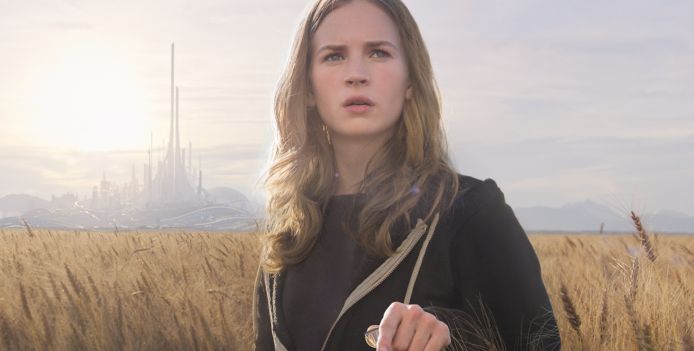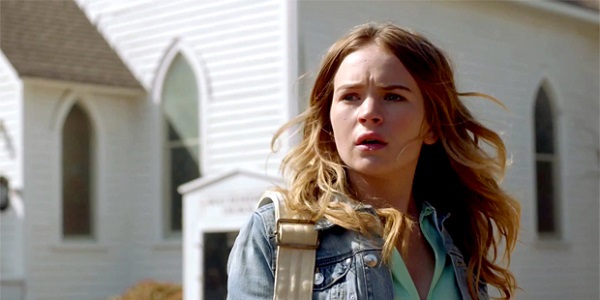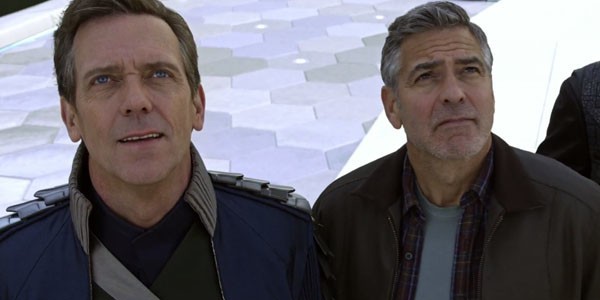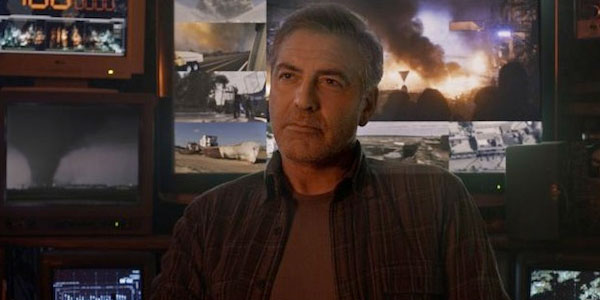TOMORROWLAND: A Cynical Film About Optimism

Alistair is a 25 year old writer based in Cambridge.…
The central idea to Tomorrowland, Disney’s latest attempt to turn a theme park attraction into a blockbuster spectacle, is flawless. Instead of being pessimistic about the future, why don’t we adopt the same attitudes of previous generations and look at the future with a sense of optimism, awe and wonder? After all, today’s younger generations are being fed miserable visions of the future by pop culture, with every major summer tentpole movie of the past few years having villains who argue that the best way to save both the planet and humanity as a whole is to destroy it.
Tomorrowland, from its very opening scene, argues that we need to stop obsessing over things that may destroy our planet (everything from climate change to terrorism) and instead band together with an optimistic outlook to the future, because if the future is unknowable, why be so negative about it?
Director Brad Bird has before taken simple messages that every child should learn in life and managed to weave them into great movies that can be enjoyed by anybody, regardless of age. In Ratatouille, it was the message that everybody has the potential to achieve greatness – a simple, kid-friendly moral that Bird managed to transform into one of the best animated movies of the modern era. Tomorrowland repeatedly loses sight of its moral as it falls deeper and deeper down its infinite plot holes, increasingly losing every element of wonder about the future as it loses every single shred of narrative clarity.
Don’t blame the director – blame the screenwriter
Although it distinctively has the optimism that defines Brad Bird’s directorial work, it is far more recognisable as a work by its co-screenwriter, Damon Lindelof. Lindelof is one of the most widely derided writers in modern pop-culture, due to his works being characterised by how many plot-holes they have and how poor their dialogue is. Despite being responsible for the finale of Lost and the abysmal screenplay for Prometheus, Tomorrowland somehow manages to be the worst thing he has ever written, perfectly justifying the criticism thrown at him that he appears to be just making the narrative up as he goes along.

One of the major criticisms is that for a movie aimed squarely at children, there is far too much narrative, so here’s an advanced apology for the amount of synopsis I am about to write. After an opening fourth-wall breaking voice-over by Frank Walker (George Clooney), we are led into a flashback at the 1964 New York World’s Fair, where as a child he tried to show inventor David Nix (Hugh Laurie) his invention – a prototype for a jetpack. Athena, a girl introduced to Frank as David’s daughter, sees the potential in his invention that Nix doesn’t, giving Frank a pin emblazoned with the letter “T” and tells him to follow her, leading him to a utopia known as “Tomorrowland”.
Fifty years later, Casey Newton, the son of a NASA space engineer, is arrested for breaking machines built to dismantle a launch pad at a former NASA launch site. After being arrested, Casey is released on bail to find that, alongside her belongings that were detained, there was one of the “T” pins that can lead her to Tomorrowland. After grasping it and visiting the alternate dimension, she becomes obsessed with visiting there, only for the pin to run out of power, sending her to a comic shop in Texas where she has managed to track down a replacement. The owners of the shop (the usually brilliant comic actors Kathryn Hahn and Keegan Michael-Key) try to kill her for taking it, before Athena, the young girl from 1964, reveals that they are robots, before destroying them and revealing that she too is a robot. Casey is revealed to be the last “chosen one” deserving of the pin and is taken to the home of Frank Walker, whose sense of optimism died out long ago.

All young children have a tendency to repeatedly ask “why?” when told a fact due to their need to have everything explained to them, something which has annoyed parents for generations. If you are writing a children’s movie, it’s best to not fill it with plot holes so the adults in the audience are as confused as their kids as to why anything is happening. In Tomorrowland, the plot appears to be engineered entirely by plot holes, with its lack of logic at least giving it an ounce of life; it may prove boring and incomprehensible to children (especially the ones in my screening, who started running round the cinema midway through the film), but at least it isn’t boring to adults, as bad as it is.
A great storyteller falls victim to lazy storytelling
If the movie wasn’t so forgettable, it would surely inspire numerous drinking games all based around its several plot holes – the only one of which I can mention without spoiling the film is the geographical locations of the robots. Our heroes are running across entire continents, yet are followed every step of the way by robots, who just appear out of nowhere every step of the way before they even arrive. Lindelof’s screenplay doesn’t even question this, which wouldn’t be a problem if the action sequences it sets up felt inspired instead of laboured. When making The Exorcist, director William Friedkin famously inserted a deliberate movie mistake into one of the shots, claiming that if the audience didn’t notice it, the film must be working. Tomorrowland proves this theory to be absolutely correct – if you are spending more time fixating on the gaps of logic than the movie itself, it is unambiguously a failure.
The movie feels like an anomaly in Brad Bird’s filmography, not just because of its lack of quality, but because its frequent monologues about optimism are rendered cynical elsewhere – it is quite ironic that a movie about unashamed positivity has left me feeling highly negative. For starters, the movie completely contradicts the message of Ratatouille, the previous film Bird directed for the studio. One of the major themes in that movie was of “selling out”, as Gusteau’s restaurant has its world famous menu dumbed down into microwave dinners franchised across the planet. The central argument was that genius lies in the individual and exploiting it for commercial gain should be frowned upon. Tomorrowland similarly argues genius lies in the individual (after all, only the “chosen one” initially gets the “T” pin), yet contains some of the most ridiculous product placement I have ever seen in movies. I understand that modern film funding requires outside sources in order to be granted the full budget it needs, especially for a $190 million original film.

Yet the product placement doesn’t even hide that it is product placement – Oreo’s, Coca Cola, eBay and Chevrolet all have their logos thrust upon the screen right before our very eyes and also feature in dialogue where the characters even talk about how much they like said products, which registers as the most cringe-worthy scenes in a pretty cringe-worthy movie.
To compare and contrast with another director who extensively uses product placement is to notice Bird’s flaws here. David Fincher is one of the best directors working today, who got his big break directing commercials – when product placement appears in his films, it happens so subtly that I rarely notice it until it gets pointed out to me. As well as being a masterful director, he is a successful advertiser in that he manages to integrate products so successfully, you don’t even notice the scenes that were commissioned to be nothing more than adverts. But then, to complain about product placement in Tomorrowland is a pointless exercise: the movie is, after all, a feature length advert for a Disneyland attraction.
Brad Bird is currently a member of Pixar’s “Brain Trust”, a group of members who help craft the stories to all of the studio’s movies. During the development of Toy Story, the group’s original members famously had a lunch meeting where they brainstormed ideas for four movies on a napkin – they ended up transforming into A Bugs Life, Monsters Inc, Finding Nemo and Wall-E. Tomorrowland seems like an idea that was written onto a napkin, without being developed any further; it seems bizarre that a man who is a member of the greatest group of storytellers alive can be responsible for something so awfully conceived, structured and plotted. The movie it resembles most is John Carter, the live-action directorial debut from another Pixar figure, Andrew Stanton. That movie was also heavily workshopped by Pixar’s Brain Trust and similarly was greeted with an audience reaction that suggested it should have just stayed on the napkin where it belonged.
VERDICT
Tomorrowland is far from the worst blockbuster I’ve ever seen, which is the only thing I can really say in its favour. It is the first directorial misstep from Brad Bird, with every narrative element that aligns it side by side with his earlier efforts outnumbered by the bad writing techniques that characterise the work of screenwriter Damon Lindelof. It is the first movie based on a theme park ride that mimics my experience of rollercoasters – you spend ages waiting for the ride, only to leave feeling exhausted and a tiny bit ill.
Have you seen Tomorrowland? Do you think it is a gigantic mess, or a future cult classic?
Tomorrowland is out now in the UK and the US. All international release dates can be found here.
(top image source: Walt Disney Studios Motion Pictures)
Does content like this matter to you?
Become a Member and support film journalism. Unlock access to all of Film Inquiry`s great articles. Join a community of like-minded readers who are passionate about cinema - get access to our private members Network, give back to independent filmmakers, and more.
Alistair is a 25 year old writer based in Cambridge. He has been writing about film since the start of 2014, and in addition to Film Inquiry, regularly contributes to Gay Essential and The Digital Fix, with additional bylines in Film Stories, the BFI and Vague Visages. Because of his work for Film Inquiry, he is a recognised member of GALECA, the Gay & Lesbian Entertainment Critics' Association.













